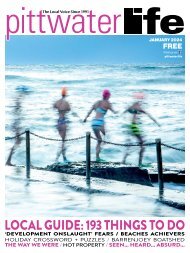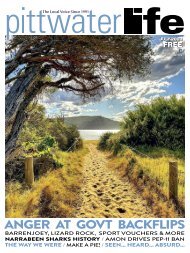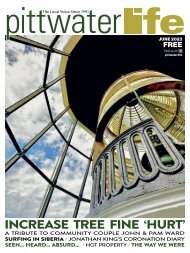Pittwater Life March 2017 Issue
The Soapbox Issue - Local Leaders Have Their Say. Great Scots. It's On For Young & Old.
The Soapbox Issue - Local Leaders Have Their Say. Great Scots. It's On For Young & Old.
Create successful ePaper yourself
Turn your PDF publications into a flip-book with our unique Google optimized e-Paper software.
Seniors Health Special<br />
STAYING STRONG<br />
Health & Wellbeing<br />
There are plenty of things you can do<br />
to help prevent and/or manage the<br />
physical problems associated with<br />
ageing... the key is knowledge.<br />
Arthritis<br />
Arthritis is inflammation of one or more<br />
of your joints it is the leading cause of<br />
pain and disability. The main symptoms<br />
of arthritis are joint pain and stiffness,<br />
which typically worsen with age. The two<br />
main types of arthritis osteoarthritis and<br />
rheumatoid arthritis damage joints in<br />
different ways.<br />
Risk factors include<br />
n Being overweight.<br />
n Having a previous injury.<br />
n Repetitive use of joints.<br />
n Family history.<br />
n Smoking.<br />
What you can do<br />
The impact of arthritis on normal<br />
activities and lifestyle varies from person<br />
to person but there are things you can do<br />
to help manage the symptoms:<br />
n Maintain a healthy weight – being<br />
overweight can increase complications<br />
of arthritis.<br />
n Stay active… and know when to rest.<br />
n Learn how to manage pain and flareups<br />
and don’t try to ignore chronic pain<br />
– talk to your doctor.<br />
n Talk to your pharmacist to check you<br />
are taking medications correctly.<br />
Contact Arthritis Australia for more<br />
information arthritisaustralia.com.au<br />
Osteoporosis<br />
Bone health is a priority for over-50s.<br />
Osteoporosis is a condition where the<br />
bones become fragile and brittle, and<br />
can fracture more easily than normal<br />
38<br />
bones. Even minor falls can cause serious<br />
fractures. Osteoporosis affects women<br />
and men, however women are at greater<br />
risk because of the rapid decline in<br />
oestrogen levels during menopause. When<br />
oestrogen levels decrease bones lose<br />
calcium and other minerals at a much<br />
faster rate. Men also lose bone as they<br />
age however their bone mass remains<br />
adequate till later in life because of<br />
testosterone levels. It is important to try to<br />
prevent the development of osteoporosis<br />
– or at least treat it as early as possible so<br />
you can minimise its effects.<br />
Risk factors include<br />
n Little or no physical activity.<br />
n Smoking.<br />
n High alcohol intake.<br />
n Thin body build or excessive weight.<br />
n Low calcium intake.<br />
n Low hormone levels – in women: early<br />
menopause; in men: low testosterone.<br />
n A direct relative who has an<br />
osteoporotic fracture.<br />
n Conditions leading to malabsorption<br />
such as coeliac disease.<br />
n Rheumatoid arthritis, chronic liver<br />
disease or kidney failure.<br />
n A history of thyroid problems.<br />
n Long-term drug treatment with<br />
corticosteroids.<br />
n Some medicines for breast cancer,<br />
prostate cancer, epilepsy and some<br />
antidepressants.<br />
What you can do<br />
n Strong bones require a lifelong intake<br />
of calcium, adequate Vitamin D and a<br />
healthy, active lifestyle.<br />
n Check you are getting enough calcium.<br />
If your diet does not contain enough<br />
calcium or your do not get regular sun<br />
exposure your doctor may suggest you<br />
take supplements.<br />
n Vitamin D is also essential for healthy<br />
Mental health and wellbeing<br />
Studies of mental health and wellbeing in old age generally paint a positive<br />
picture however symptoms of depression, stress and anxiety among older<br />
people can be easily missed.<br />
According to beyondblue symptoms such as sadness, sleep and appetite<br />
problems or mood changes may be dismissed as a ‘normal’ part of getting older.<br />
Symptoms such as poor concentration and memory difficulties may also be<br />
confused with other conditions such as dementia.<br />
It’s normal to feel sad or moody or down from time to time but if these<br />
feelings are preventing you from getting the most out of life, help and support is<br />
available… not matter what your age.<br />
Asking your doctor for advice about your mental health is a good first start – if<br />
necessary they can refer you to services that best suit your needs.<br />
For more information go to www.beyondblue.org.au<br />
MARCH <strong>2017</strong><br />
bones. It is formed by the action of<br />
sunlight on the skin, and plays an<br />
important role in increasing calcium<br />
absorption from foods.<br />
n Regular exercise is important for bone<br />
strength, maintaining balance and<br />
preventing falls.<br />
Contact Osteoporosis Australia for more<br />
information osteoporosis.org.au<br />
Bladder and bowel health<br />
As you age your pelvic floor muscles –<br />
the ‘sling’ of muscles that supports the<br />
bladder, bowel and uterus in women and<br />
the bladder and bowel in men – may stretch<br />
and weaken. This can cause incontinence –<br />
the leakage of urine, faeces or wind when<br />
you do not mean it to happen. The good<br />
news is for many people simple exercises<br />
can help prevent problems.<br />
Risk factors include<br />
A number of factors may contribute to<br />
pelvic floor muscles weakening including:<br />
n In women, the effect of pregnancy and<br />
childbirth and changes in hormone<br />
levels after menopause.<br />
n Being overweight.<br />
n Chronic constipation.<br />
n Chronic cough.<br />
n Frequent lifting of heavy objects.<br />
What you can do<br />
n Eat plenty of high fibre from a wide<br />
variety of foods, to avoid constipation.<br />
n Maintain a healthy body weight.<br />
n If you smoke stop. Chronic coughing<br />
associated with smoking can weaken<br />
your pelvic floor.<br />
n When using the toilet, sit down properly<br />
with your feet firmly supported. This<br />
helps to fully relax your pelvic floor and<br />
sphincter muscles. Also, don’t strain.<br />
n Don’t get into the habit of going to the<br />
toilet “just in case”. Go only when you<br />
need to.<br />
n Visit your doctor if you suspect a<br />
urinary tract infection or if you have<br />
ongoing respiratory problems.<br />
n Daily exercise helps stimulate<br />
movement of the bowel and keeps your<br />
weight healthy.<br />
n Avoid heavy lifting as this weakens your<br />
pelvic floor.<br />
n Do pelvic floor exercises regularly.<br />
There are a number of health<br />
professionals that specialise in the area of<br />
continence who you can turn to for help.<br />
The Continence Foundation<br />
(continence.org.au) recommends talking<br />
to your doctor or a continence nurse<br />
advisor on the National Continence<br />
Helpline 1800 33 00 66 to help determine<br />
the best course of action.

















